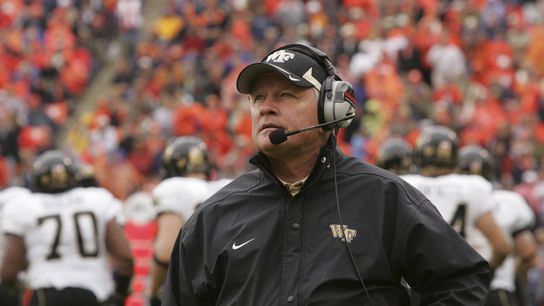From 2006-08, Jim Grobe's Wake Forest team went a combined 28-12 with an ACC championship and subsequent Orange Bowl appearance and two bowl victories. It was easily the best three-year stretch in the modern era of Wake Forest football. In the ensuing five seasons, though, Wake Forest went just 23-38 with only one bowl trip - a loss - and zero winning seasons. Now Grobe finds himself preparing for his first season as an ACC football analyst rather than his 14th as Wake Forest's head coach.
What changed?
Success, and how the Demon Deacons reacted to it.
All that success in the middle portion of the last decade invited Wake Forest into the living rooms of a different type of recruit, and Grobe accepted those invitations. And that turned out to be his downfall.
"We kind of got away from that dynamic and started recruiting a little bit better player who probably doesn't have a good enough love for the game," Grobe told Jon Solomon of CBS Sports. "Quite frankly, I ended up spending a lot of time last year with five knotheads who were always missing class, missing study hall, missing tutoring, late to meetings, late to practices, and ultimately I just wouldn't play them. They were very talented kids who could have helped us win games. There's no question I could have done a better job."
On top of that, Wake Forest changed its offense to fit the strengths of quarterback Riley Skinner. In Skinner's freshman season of 2006, the same year Wake Forest won its more-improbable-by-the-year ACC title, Skinner threw 260 passes for 2,051 yards with nine touchdowns and five interceptions. By his senior year of 2009, Skinner tossed 400 passes for 3,160 yards with 25 touchdowns against 12 interceptions. That was also the third straight year Wake Forest saw its win total decrease, from 11 to nine to eight and then to five in 2009. Skinner's first 3,000-yard season also coincided with his first non-bowl season. In 2006, Wake Forest ran the ball 527 times and threw 287 passes. Seven seasons later, the ratio flipped; the Deacons threw 414 passes against 388 rushes. They still ranked 120th nationally in total offense.
While adapting a scheme to fit the personnel is almost always a pragmatic decision for coaches, it wasn't at Wake Forest. The Demon Deacons' success was built on a misdirection offense that mitigated Wake Forest's talent disadvantage. By 2009, Wake Forest was running a pro-style offense that wasn't significantly different from anyone else - with less talent.
"I hate to say that Riley Skinner hurt us, because he won more games than any quarterback in Wake Forest history, but we ended up in a pro-style offense that didn't really fit us expect for Skinner," Grobe said. "We were throwing the ball every snap. We lost all that misdirection stuff. We just got stuck."
But when Wake Forest's roster and scheme looked completely different than its peak season of 2006, it shouldn't be a surprise that their final record didn't look anything like 2006, either.
To be fair, all these decisions most certainly felt like the right ones at the time. Why not recruit better players than were previously available to you? Why not change your offense to fit your quarterback's strengths? Success sometimes breeds a cruel temptation. When a new door opens, it's hard not to walk in and see what's inside.
